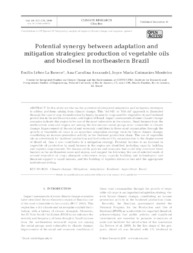Potential synergy between adaptation and mitigation strategies: production of vegetable oils and biodiesel in northeastern Brazil.
Potential synergy between adaptation and mitigation strategies: production of vegetable oils and biodiesel in northeastern Brazil.
Author(s): LA ROVERE, E. L.; AVZARADEL, A. C.; MONTEIRO, J. M. G.
Summary: In this study we discuss the potential of integrated adaptation and mitigation strategies to addess problems arising from climate change. This ‘Ad-Mit’ or ‘Mit-Ad’ approach is illustrated through the case of crop diversification by family farmers to crops used for vegetable oil and biodiesel production in the northeastern semi-arid region of Brazil. Impact assessments of some climate change scenarios indicate this region to be one of the most vulnerable in the country. Small farmers from the northeastern semi-arid region are among the low-income social groups most vulnerable to climate change. Improvement of the social and economic conditions in these rural communities through the growth of vegetable oil crops is an important adaptation strategy vis-à-vis future climate change, constituting an income-generation activity in the biodiesel production chain. The use of vegetable oils as a feedstock for biodiesel production and fuel reduces CO2 emissions due to the displacement of diesel oil, thus it also contributes to a mitigation strategy. Potential barriers to an increase in vegetable oil production by small farmers in the region are identified, including capacity building and logistics requirements. We discuss public policies and measures that could help overcome these barriers in the northeastern semi-arid region, and suggest the following: the use of selected seeds of several vegetable oil crops alongside subsistence crops, capacity building and technological and financial support to small farmers, and the building of logistics infrastructure and the appropriate institutional setting.
Publication year: 2009
Types of publication: Journal article
Unit: Embrapa Soils
Keywords: Adaptation, Agricultura, Mitigation, Mudança Climática, biodiesel, climate change
Observation
Some of Embrapa's publications are published as ePub files. To read them, use or download one of the following free software options to your computer or mobile device. Android: Google Play Books; IOS: iBooks; Windows and Linux: Calibre.
Access other publications
Access the Agricultural Research Database (BDPA) to consult Embrapa's full library collection and records.
Visit Embrapa Bookstore to purchase books and other publications sold by Embrapa.

